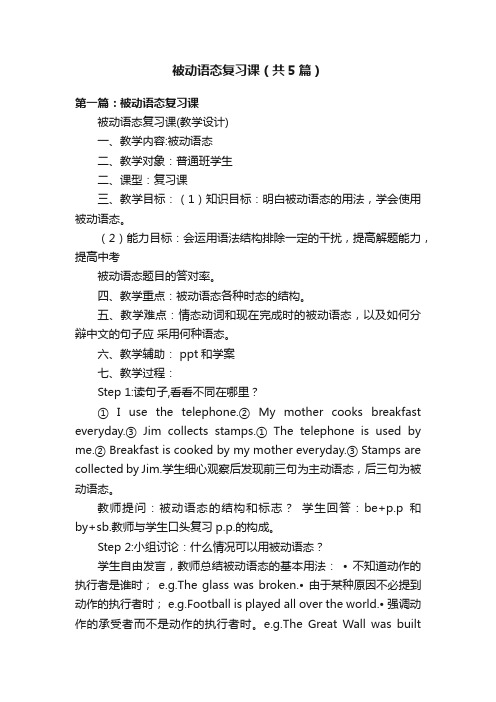高中英语语法不用被动语态的情况2讲课稿
英语不能用被动语态的情况

不能用被动语态的情况初中语法:1) 不及物动词或动词短语无被动语态:appear, die disappear, end (vi. 结束), fail, happen, last, lie, remain, sit, spread, stand break out, come true, fall asleep, keep silence, lose heart, take place.After the fire, very little remained of my house.比较:rise, fall, happen是不及物动词;raise, seat是及物动词。
(错) The price has been risen.(对) The price has risen.(错) The accident was happened last week.(对) The accident happened last week.(错) The price has raised.(对) The price has been raised.(错) Please seat.(对) Please be seated.要想正确地使用被动语态,就须注意哪些动词是及物的,哪些是不及物的。
特别是一词多义的动词往往有两种用法。
解决这一问题唯有在学习过程中多留意积累。
2) 不能用于被动语态的及物动词或动词短语:fit, have, hold, marry, own, wish, cost, notice, watch agree with, arrive at / in, shake hands with, succeed in, suffer from, happen to, take part in, walk into, belong to This key just fits the lock.Your story agrees with what had already been heard.3) 系动词无被动语态:appear, be become, fall, feel, get, grow, keep, look, remain, seem, smell, sound, stay, taste, turnIt sounds good.4) 带同源宾语的及物动词,反身代词,相互代词,不能用于被动语态:die, death, dream, live, lifeShe dreamed a bad dream last night.5) 当宾语是不定式时,很少用于被动语态。
高中英语知识点归纳被动语态和主动语态的转换

高中英语知识点归纳被动语态和主动语态的转换高中英语知识点归纳:被动语态和主动语态的转换被动语态和主动语态是英语语法中的两个重要概念。
被动语态是用来描述动作的接受者,而主动语态则强调动作的执行者。
在这篇文章中,我们将对高中英语中被动语态和主动语态的转换进行归纳总结,帮助大家更好地理解和运用这两种语态。
一、基本概念1. 主动语态:句子的主语是动作的执行者。
例如:- 主动语态:Tom eats an apple.(汤姆吃了一个苹果。
)2. 被动语态:句子的主语是动作的接受者。
例如:- 被动语态:An apple is eaten by Tom.(一个苹果被汤姆吃了。
)二、转换方法1. 把句子中的宾语变成主语,同时在谓语动词前加上be动词的相应形式,同时需要调整句子时态和语态。
例如:- 主动语态:He sings a song.(他唱了一首歌。
)- 被动语态:A song is sung by him.(一首歌被他唱了。
)2. 如果主动语态的句子包含间接宾语和直接宾语,可以把其中一个宾语变为主语,并在谓语动词前加上be动词的相应形式。
例如:- 主动语态:He gave me a book.(他给了我一本书。
)- 被动语态:I was given a book by him.(我被他给了一本书。
)3. 如果主动语态的句子中有介词短语作状语,需要将介词短语移到句子的末尾,并在谓语动词前加上be动词的相应形式。
例如:- 主动语态:They cut down the trees in the garden.(他们砍掉了花园里的树。
)- 被动语态:The trees in the garden were cut down by them.(花园里的树被他们砍掉了。
)4. 如果主动语态的句子中有连系动词,需要把连系动词变成被动语态的be动词的相应形式。
例如:- 主动语态:She is writing a letter.(她正在写信。
人教版高中英语选修7 被动语态第二讲:不使用被动语态的几种情况(2)(课件)

the ll-educated.
学习建议
语法归纳总结——被动语态 第二讲 不使用被动语态的几种情况
要点归纳
要点1 某些动词
不及物动词及不及物动词短语不用被动: rise, happen, succeed, lie, disappear, last等以及take place(发 生), come up(提出), run out(用光), break out(爆发), turn out(结果是,表明是)等短语。例如:
要点4 描述事物属性特征时
在描述事物的属性特征而不是强调动作时,句子应用主动语 态。常见的动词有:wash, sell, open, close, shut, lock, write, read, cut, wear等。如:
要点5 个别短语的习惯用法
在短语be to blame for……(应为……而受批评,应为…… 而负责)和be to let(有待出租)中只用主动形式。如:
要点6 主动表被动
在动词want/need/require以及be worth 后可以用doing来表示被 动的意思。如:
典型应用
1.(重庆)Food supplies in the flood-stricken area ___B___. We must act
i1m.m先ed根ia据tel选y b项ef确ore定th考er点e’s属no于th主ing动le、ft.被动; 2.注A.意ha选ve项ru所n o给ut动词的特殊B.性ar;e running out
高中英语语法不用被动语态的情况2讲课稿

高中英语语法不用被动语态的情况2不用被动语态的情况一、不及物动词或动词短语无被动语态:常见的不及物动词:appear, die disappear, end (vi. 结束), fail, happen, last, lie, remain, sit, spread, standbreak out, come true, fall asleep, keep silence, lose heart, take place.比较:rise, fall, happen是不及物动词;raise, seat是及物动词。
(错) The price has been risen. (对). (错) The accident was happened last week.(对)(错) The price has raised.(对)(错) Please seat. (对)(错)After the fire, nothing was remained.(对)要想正确地使用被动语态,就须注意哪些动词是及物的,哪些是不及物的。
特别是一词多义的动词往往有两种用法。
解决这一问题唯有在学习过程中多留意积累。
二、不能用于被动语态的及物动词或动词短语有一些及物动词,尽管他们的后面跟了宾语,但是也不能用于被动语态:fit, have, hold, marry, own, wish, cost, notice, watch agree with, arrive at / in, shake hands with, succeed in, suffer from, happen to, take part in, walk into, belong to例:This key just fits the lock. Your story agrees with what had already been heard.(错)The room was entered by her just now.(对)(错)The queue was jumped by Tom. (对)(错)He isn’t agreed with by me. (对)三、系动词无被动语态:常用的系动词有:1、状态类 2、状态保持不变 3、状态改变4、与感官有关的5、好象6、结果类的例:It sounds good.The building looks very beautiful. Your idea proved to be wrong.四、带同源宾语的及物动词,宾语为反身代词,相互代词或者不定式,不能用于被动语态:die, death, dream, live这几个动词常跟同源宾语。
2015届高考英语一轮复习 语法讲解 动词短语和动词的时态 语态 4.28 不用被动语态的八大场合课件 新人教版

◆
◆ 28 不用被动语态的八大场合
场 合 一
某些感官动词或系动词等后跟形容词、名 词等可以表示被动意义,如: feel, look, smell, taste, sound等。主语通常是事物,且表示该 事物本身具有某一固定特征。
例 句
The dish tastes delicious. 这菜味道好极了。 The lake smells terrible.这个湖散发出难闻 的气味。
答 案 解 析
D。belong to没有被动 形式, 也不用于进行时 态。根据句意可知此处 应用一般现在时。故答 案为D。
D。系动词sound , smell , feel , taste, look等后跟名 词、形容词等时, 往往用 主动形式表被动意义。故 答案为D。句意:这种冰淇 淋有种香蕉和草莓的混合 味道。
◆
◆
28 不用被动语态的八大场合
难 点 _____ comfortably. 自 测 A. is worn 9
This kind of glasses made in Shanghai
B. wears D. are worn
答 案 解 析
C. wearing
B。考生做本题时易误选A, 认为glasses和wear之间存在 逻辑上的动宾关系, 谓语动 词本应用被动语态,但英语中 有些动词, 如wear, sell, wash, write等常用主动形式表示被 动意义。故选B项。
例 句
We can’t laugh at him. →He can’t be laughed at by us. Time must be made full use of. 一定要充分利用时间。
◆
◆ 28 不用被动语态的八大场合
被动语态复习课(共5篇)

被动语态复习课(共5篇)第一篇:被动语态复习课被动语态复习课(教学设计)一、教学内容:被动语态二、教学对象:普通班学生二、课型:复习课三、教学目标:(1)知识目标:明白被动语态的用法,学会使用被动语态。
(2)能力目标:会运用语法结构排除一定的干扰,提高解题能力,提高中考被动语态题目的答对率。
四、教学重点:被动语态各种时态的结构。
五、教学难点:情态动词和现在完成时的被动语态,以及如何分辩中文的句子应采用何种语态。
六、教学辅助: ppt和学案七、教学过程:Step 1:读句子,看看不同在哪里?① I use the telephone.② My mother cooks breakfast everyday.③ Jim collects stamps.① The telephone is used by me.② Breakfast is cooked by my mother everyday.③ Stamps are collected by Jim.学生细心观察后发现前三句为主动语态,后三句为被动语态。
教师提问:被动语态的结构和标志?学生回答:be+p.p和by+sb.教师与学生口头复习p.p.的构成。
Step 2:小组讨论:什么情况可以用被动语态?学生自由发言,教师总结被动语态的基本用法:• 不知道动作的执行者是谁时;e.g.The glass was broken.• 由于某种原因不必提到动作的执行者时;e.g.Football is played all over the world.• 强调动作的承受者而不是动作的执行者时。
e.g.The Great Wall was builtlong long ago.Step 3:举例子,分析题目(时态,单复数),发现规律,使用学案作总结。
1.一般现在时:They make shoes in that factory.→Shoes are made(by them)in that factory.总结: 一般现在时被动语态结构为am/is /are +p.p.完成《学案》选择题1、2 2.一般过去时They bought ten computers last term.→Ten computers were bought(by them)last term.总结: 一般过去时被动语态结构为was /were +p.p.完成《学案》选择题3、43.一般将来时(含will)They will finish the work tomorrow.→The work will be finished(by them)tomorrow.总结: 一般将来时被动语态结构为will+be +p.p.完成《学案》选择题5、6 4.现在完成时:(have/has+p.p.)Danny has finished the project.→The project has been finished(by Danny).总结: 现在完成时被动语态结构为have/has+been +p.p.完成《学案》选择题7、8 5.含情态动词(must, should, may, can, could, might…)Amy can make a cake .→A cake can be made(by Amy).总结: 含情态动词被动语态结构为情态动词+be +p.p.完成《学案》选择题9、10 Step 4:教师提出:take place, happen, belong to无被动语态;商场开业(open)无须用被动语态。
全国通用中考英语语法复习不用被动语态

A. have been married
B.fels
B. got married
C. were married
D. have got married
解析考查动词时态。句意:我的祖父母已经结婚60多年了,他们彼此深爱着对方。for over 60 years 超过60年,是属于时间段,不能用过去式,先排除B、C。虽然be married 和get married者都是表示 已婚、结婚,但be married强调的是状态,而后者更侧重于动作,D也可排除。故选A。
5.—What __________ if they ____A______ to the meeting late? —Sorry, I don’t know.
will happen; go
A
ITEM
B
ITEM
happened; go
happens; will go
C
ITEM
D
ITEM
will happen; will go
当cut,sell,read,write,fill,cook,lock,wash,drive,keep 等词带状语修饰语时。
当break out、take place、shut off、turn off、work out等动词词组表 示"发生、关闭、制定"等意思时。
want,require,need后面的动名词用主动表示被动含义。
当谓语动词和宾语构成一个不可分割的 整体时,即固定短语,句子不可变为被 动语态
It took him a long time to make up his mind. 他用了很久才下定决心。 Who’s going to take his place after he leaves? 他走了谁来顶替他?
高中语法教学实践(2篇)

第1篇一、引言语法教学是高中英语教学的重要组成部分,它对于提高学生的英语水平、培养学生的英语思维能力和提高英语教学质量具有重要意义。
本文将从以下几个方面对高中语法教学实践进行探讨。
二、教学目标1. 帮助学生掌握英语语法基础知识,提高学生的英语语言运用能力。
2. 培养学生的英语思维能力,提高学生的英语学习兴趣。
3. 提高英语教师的教学水平,促进教师的专业成长。
三、教学策略1. 精讲与精练相结合在语法教学中,教师应注重精讲与精练相结合。
精讲是指教师在课堂上详细讲解语法知识,使学生掌握语法规则;精练是指通过大量的练习,巩固学生对语法知识的理解和运用。
在精讲过程中,教师应注重以下几点:(1)明确教学目标,有的放矢地进行讲解。
(2)结合实际语境,让学生在具体的语言环境中理解语法知识。
(3)注重语法知识的层次性,由浅入深地进行教学。
在精练过程中,教师应注重以下几点:(1)设计多样化的练习题,提高学生的兴趣。
(2)注重练习的针对性,针对学生的薄弱环节进行练习。
(3)及时反馈,帮助学生纠正错误。
2. 任务型教学法任务型教学法是一种以学生为中心的教学方法,强调学生在完成任务的过程中学习和运用语言。
在语法教学中,教师可以设计以下任务:(1)角色扮演:让学生在角色扮演的过程中运用所学语法知识。
(2)小组讨论:让学生在小组讨论中运用语法知识,提高语言表达能力。
(3)写作:让学生在写作过程中运用所学语法知识,提高写作水平。
3. 多媒体教学多媒体教学具有生动、形象、直观的特点,能够激发学生的学习兴趣。
在语法教学中,教师可以利用以下多媒体手段:(1)PPT课件:将语法知识以图文并茂的形式呈现,提高学生的注意力。
(2)视频:通过观看英语电影、电视剧等,让学生在真实语境中感受语法知识。
(3)音频:让学生听英语歌曲、广播等,提高听力水平,同时巩固语法知识。
4. 互动式教学互动式教学是一种以学生为主体,教师为主导的教学模式。
在语法教学中,教师可以采用以下互动式教学方法:(1)提问:教师提出问题,引导学生思考,提高学生的思维能力。
- 1、下载文档前请自行甄别文档内容的完整性,平台不提供额外的编辑、内容补充、找答案等附加服务。
- 2、"仅部分预览"的文档,不可在线预览部分如存在完整性等问题,可反馈申请退款(可完整预览的文档不适用该条件!)。
- 3、如文档侵犯您的权益,请联系客服反馈,我们会尽快为您处理(人工客服工作时间:9:00-18:30)。
高中英语语法不用被动语态的情况2
不用被动语态的情况
一、不及物动词或动词短语无被动语态:
常见的不及物动词:appear, die disappear, end (vi. 结束), fail, happen, last, lie, remain, sit, spread, stand
break out, come true, fall asleep, keep silence, lose heart, take place.
比较:rise, fall, happen是不及物动词;raise, seat是及物动词。
(错) The price has been risen. (对)
. (错) The accident was happened last week.(对)
(错) The price has raised.(对)
(错) Please seat. (对)
(错)After the fire, nothing was remained.(对)
要想正确地使用被动语态,就须注意哪些动词是及物的,哪些是不及物的。
特别是一词多义的动词往往有两种用法。
解决这一问题唯有在学习过程中多留意积累。
二、不能用于被动语态的及物动词或动词短语
有一些及物动词,尽管他们的后面跟了宾语,但是也不能用于被动语态:fit, have, hold, marry, own, wish, cost, notice, watch agree with, arrive at / in, shake hands with, succeed in, suffer from, happen to, take part in, walk into, belong to
例:This key just fits the lock. Your story agrees with what had already been heard.
(错)The room was entered by her just now.(对)
(错)The queue was jumped by Tom. (对)
(错)He isn’t agreed with by me. (对)
三、系动词无被动语态:
常用的系动词有:1、状态类 2、状态保持不变 3、状态改变
4、与感官有关的
5、好象
6、结果类的
例:It sounds good.
The building looks very beautiful. Your idea proved to be wrong.
四、带同源宾语的及物动词,宾语为反身代词,相互代词或者不定式,不能用于被动语态:die, death, dream, live这几个动词常跟同源宾语。
例:She dreamed a bad dream last night. We live a happy life.
I taught myself French. They love each other. She likes to swim.
五、主动形式表示被动意义
1)wash, clean, cook, iron, look, cut, sell, read, wear, feel, draw, write, sell, drive等动词后面有程度副词修饰…
The book sells well.这本书销路好。
This knife cuts easily.这刀子很好用。
2) 在need, require, want,deserve后的可用动名词主动形式表达被动含义。
形容词worth后必须跟doing
The door needs repairing.= The door needs to be repaired.
This room needs cleaning. = .
The house wants painting.= .
The floor requires washing= .
This book is worth reading. His suggestion is worth considering. This clock is hardly worth repairing.
4) 特殊结构:make sb. heard / understood (使别人能听见/理解自己),have sth. done ( 要某人做某事)。
六、被动形式表示主动意义
be determined, be pleased, be graduated (from), be finished, be prepared (for), be occupied (in), get marries
例:He is graduated from a famous university.
注意:表示同某人结婚,用marry sb. 或get married to sb. 都可。
He married a rich girl. He got married to a rich girl.
1. —Have you moved into the new house? —Not yet. The rooms __________.
A. are being painted
B. are painting
C. are painted
D. are being painting
2. Great changes __________ in China since 1978.
A. have taken place
B. took place
C. have been taken place
D. were taken place
3.The war_____in 1937.
A . was broken out
B . had been broken out
C . has broken out
D . broke out
4.Mary realized she_________
A . was making fun of
B . was made fun
C . was being made fun of
D . was being made fun
5. The story______in China .
A . was taken place
B . was happened
C . took place
D . has been taken place
6. The house_____my parents A . is belong to B . belong to C . belongs to D . is belonged to
7. The new suspension bridge ___ by the end of last month.
A . has been designed
B . had been designed
C . was designed
D . would be designed
8. That suit __ over 60 dollars. A . had costed B . costed C . is costed D . cost
9. --- Do you like the material? --- Yes, it ___ very soft. A . is feeling B . felt C . feels D . is felt
10. --- What do you think of the book? ---Oh, excellent. It's worth ___ a second time.
A . to read
B . to be read
C . reading
D . being read
11. This page needed ___ again. A . being checked B . checked C . to check D . to be checked
12. The boy___ streets without pay in the old days.
A. was made to clean
B. made clean
C. made to clean
D. was made clea n
13. These stones___well. A. are fitted B. fit C. fits D. is fitted。
